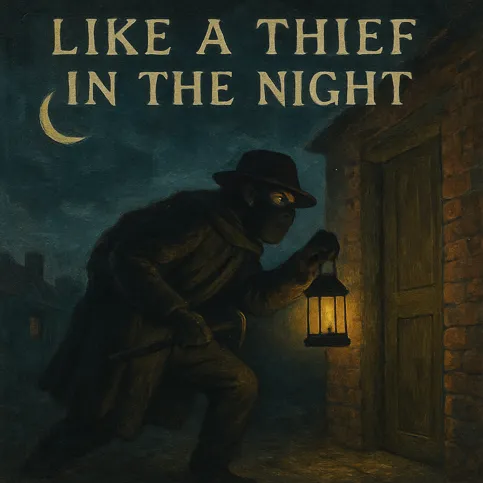What is the meaning of the phrase “like a thief in the night”?
Something happens secretly, unexpectedly, and without being seen or heard.
What is the origin of the phrase “like a thief in the night”?
The phrase “like a thief in the night” originates from Hebrew and dates all the way back to the Christian Bible, more specifically in the New Testament, 1 Thessalonians 5:2. It states “For yourselves know perfectly that the day of the Lord so cometh as a thief in the night.” This means that its arrival of the Lord will be sudden and unexpected, similar to how a thief might enter a house without warning, unseen, unheard, and completely unnoticed or undetected.
The chapter features the words of the apostle Paul, who was talking about the return of Jesus Christ, also known as the Second Coming, and it encourages believers to live a life of watchfulness, sobriety, and righteous conduct while waiting for His return.
This is then paraphrased in the gospel of Peter, specifically 2 Peter 3:10, where again, the thief’s secrecy and the night’s darkness represent vulnerability and unpredictability, thus warning the believers about unprepared consequences, and urging vigilance.
The metaphor emphasizes the unexpected nature of the event and the lack of warning given. Depicting something or someone that arrives or happens unexpectedly, swiftly, and surreptitiously, much like the actions of a thief who operates under the cover of darkness. It conveys a sense of suddenness, stealth, and surprise, often carrying negative implications or connotations.
How to use the phrase “like a thief in the night”
The phrase “like a thief in the night” can be used to depict anything that has happened unexpectedly. A literal interpretation is possible, for example, when someone has been burgled.
That said however, a figurative use of the expression is more common. For example, it can be used to refer to the sudden arrival of a person or animal, an unexpected turn of events, such as the break up of a long-term relationship, surprising news, or the sudden onset of an illness, a death. or a natural disaster.
Alternative ways of saying “like a thief in the night”
There are many similar words and phrases that may be considered synonymous with the phrase “like a thief in the night”. Here follows some examples:
- out of nowhere
- like a bolt from the blue
- in the blink of an eye
- on the sly
- without warning
- unexpectedly
- surprisingly
- caught one unawares
Notable uses of the phrase “like a thief in the night”
Literature
Although not using the exact phrase, the bard William Shakespeare used the image of night and stealth in his narrative poem The Rape of Lucrece, released in 1594, where its paraphrased to connote stealth and violation under cover of night.
Film
In the film A Thief in the Night, released in 1972, a young woman awakes one morning to find the Rapture has happened, taking her recently converted newlywed husband and leaving her behind. This new world is abandoned by God and dominated by the powers of evil, represented by a one-world government.
This was widely watched and highly influential in American evangelical circles, where the phrase became deeply associated with the Rapture, and was often used in sermons and religious discourse. The film generated more than $1 million in sales, which was an unprecedented amount in rental revenues at the time.
It is perhaps unsurprising then that the phrase also came to be used in contemporary Christian music, for example, in the song Thief in the Night by 2nd Chapter of Acts, released in 1981.
Music
However, the phrase is also used widely outside of religion. For example, the British Rhythm and Blues artist Craig David used the phrase as a romantic metaphor in his song Thief in the Night released in 2003 to depict stealth and sudden emotional upheaval in love, drawing on the idiom’s surprise and intensity.
Similarly, the Rolling Stones also released a song titled Thief in the Night, which was released in 1997 and is featured on their album Bridges to Babylon. Here, the track uses the phrase to denote emotional vulnerability and moral ambiguity.

